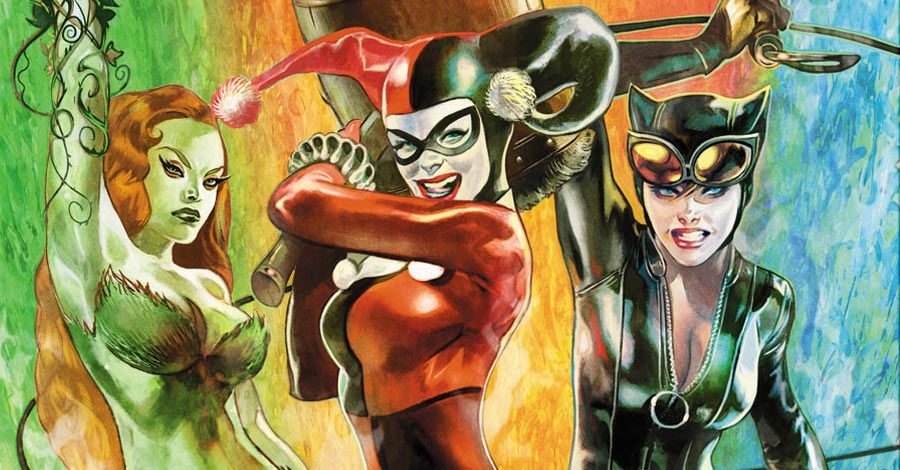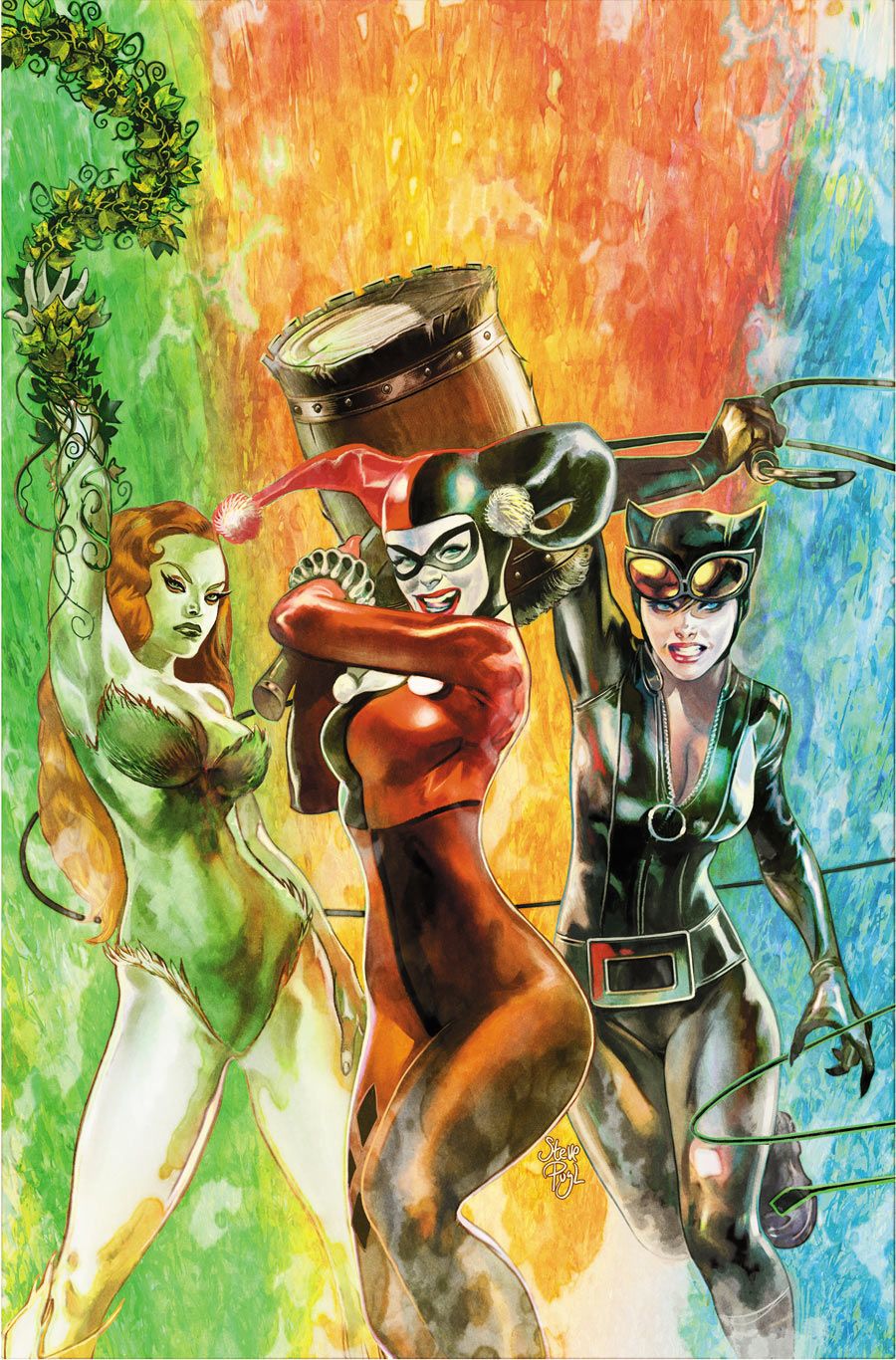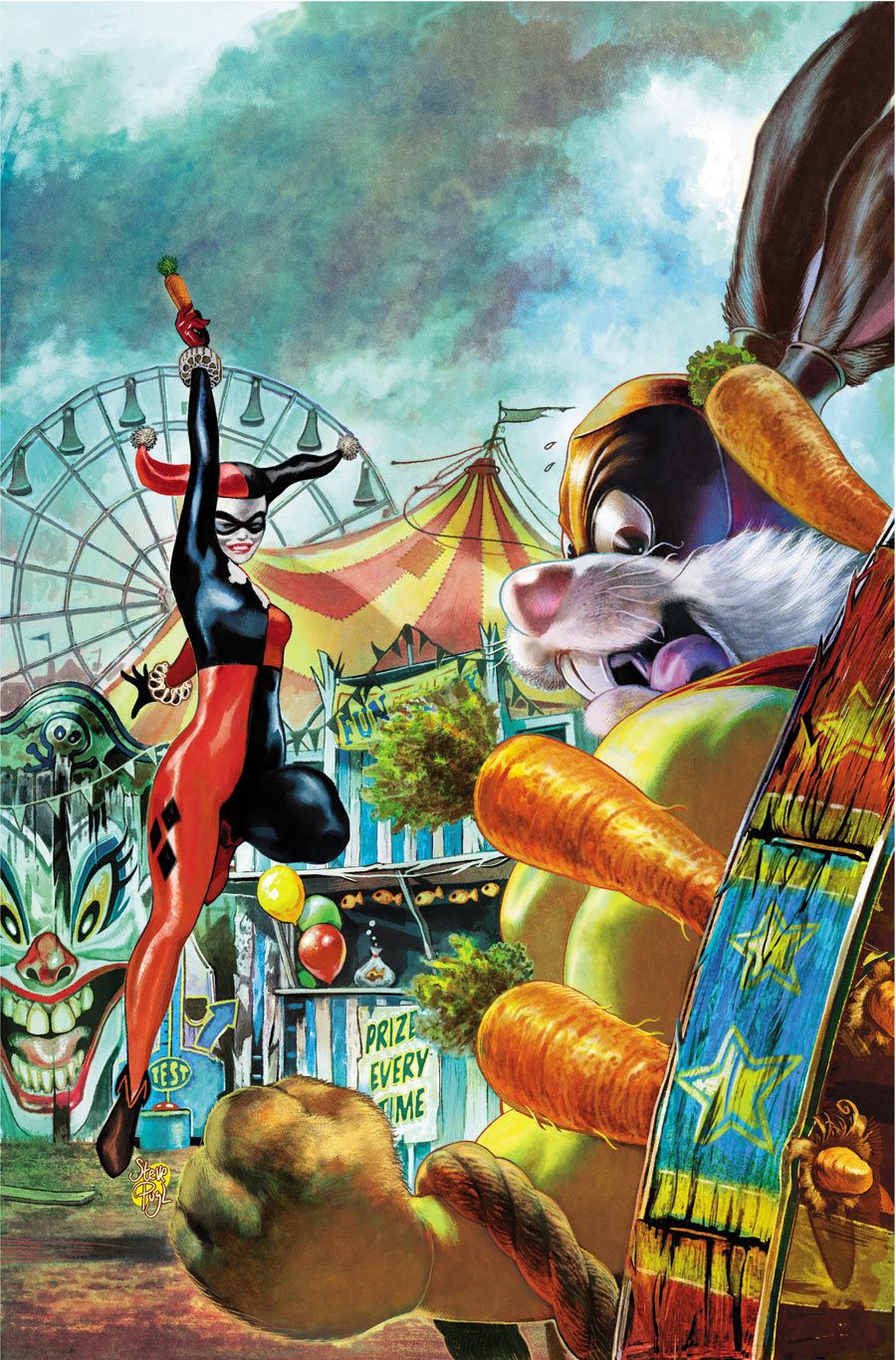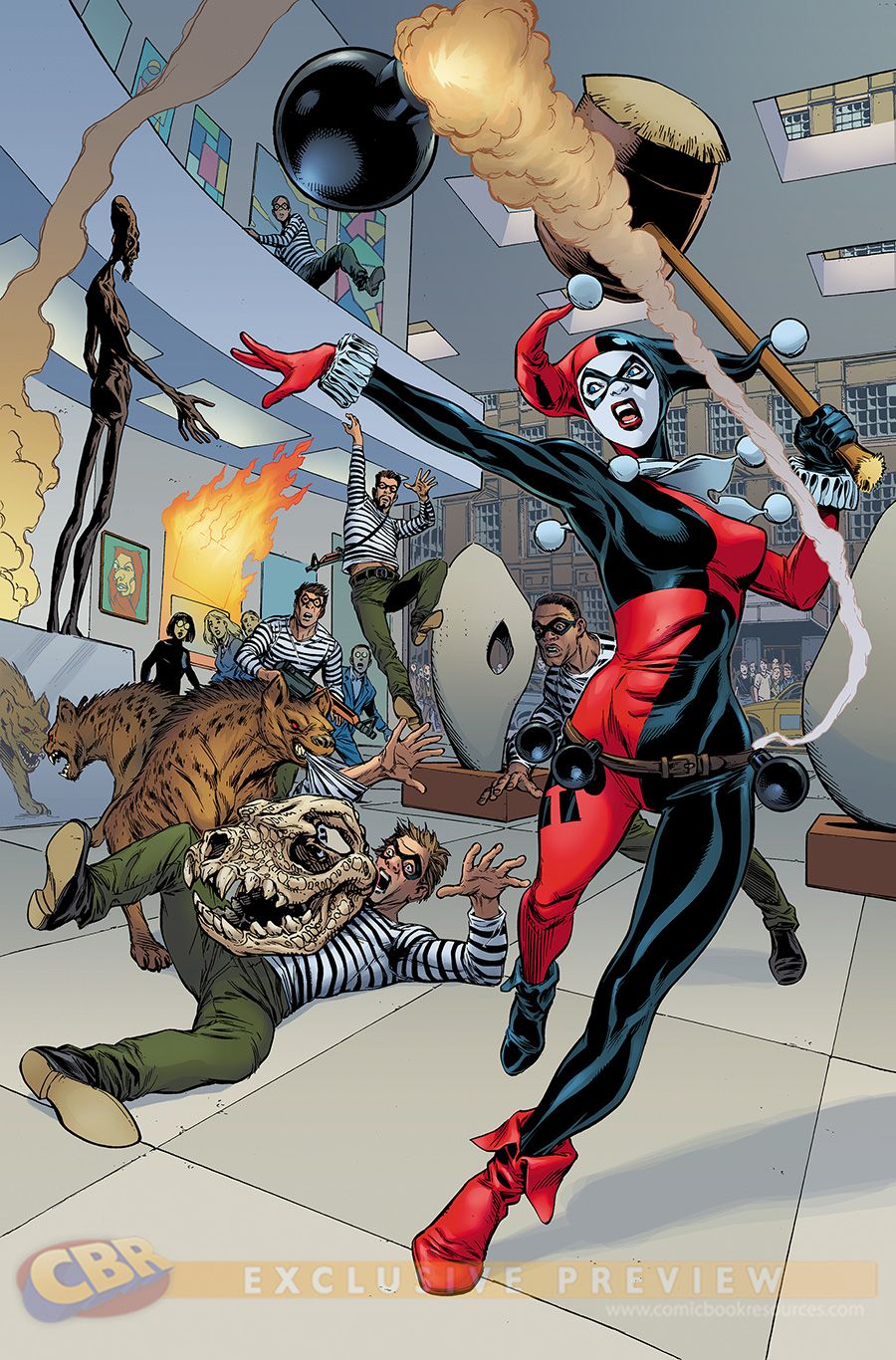While her solo comic book series continues tearing up the monthly sales charts, Harley Quinn actually first appeared on the Emmy Award-winning television series "Batman: The Animated Series" in 1992. British comic book creator Steve Pugh is a long-time fan of the character and channeled his love for Joker's infamous sidekick full throttle toward "Convergence: Harley Quinn," the upcoming two-part miniseries from DC Comics, which ties directly into the publisher's upcoming line-wide "Convergence" event.
RELATED: DC's Lead "Convergence" Writer Shares Secrets of the Multiverse Mash-Up
Picking up from where the series "Gotham City Sirens" ended in pre-"Flashpoint" continuity, Pugh's story opens with a nearly "normal" Harley Quinn playing the unfamiliar role of caregiver for a fallen friend. That is until Catwoman and Poison Ivy jumpstart the Maiden of Mischief as their world is in desperate need of a hero to challenge the other-worldly menace known as Captain Carrot.
That's right. Captain Carrot is back and Pugh confirms to CBR News that the rest of the Amazing Zoo Crew -- including his favorite, Pig Iron -- will also be heavily featured in the story, which is illustrated by Phil Winslade.
Primarily working as an artist, Pugh is no stranger to comics but his previous writing credits are limited. Nonetheless, editor Marie Javins liked his work on "Hotwire" for Radical Comics, enough to offer him a two-issue run with one of DC's hottest characters.
Before his current run on Marvel's "All-New Invaders," Pugh provided art on DC's New 52 iteration of "Animal Man" written by Jeff Lemire. Pugh suggests "Animal Man" wasn't really a superhero book, which makes it a perfect starting point for a miniseries about a battle between a frenzied anti-hero and a super-powered rabbit. And as we learn more and more about "Convergence," the madness that's on it's way in "Convergence: Harley Quinn" is likely just the beginning.
CBR News: The solicitation for your first issue teases that life for Harley Quinn has "become downright normal over the last year." That, in and of itself, seems wildly improbable for a character like Harley. [Laughs] What does "downright normal" mean for Harley?
Steve Pugh: You're right. I don't think Harley's life can ever be normal. She's too unique an individual, but she has achieved a certain level of domesticity. She is no longer a henchman or the little sister to bigger characters. She even has a certain level of responsibility in her life and is even looking after somebody else's welfare. She has somebody new in her life, someone in his own way just as damaged as she was. In fact, she was the one who damaged him.
That sounds more like Harley. [Laughs] Is she self-aware that "Convergence" is happening?
She is aware of her part of it. She knows that she has to fight the rabbit or the city will be destroyed and she knows that Gotham probably wouldn't have chosen her as a champion given that everybody's life will depend on the outcome.
"She has to fight the rabbit." See, Harley's life is not normal. That said, I'm a long time fan of Captain Carrot, so I am psyched that she faces off against him. What can you tell us about your version of Captain Carrot?
Well, just as I've tried to stay in the spirit of "Gotham City Sirens," I very much tried to stay in the spirit of the original "Captain Carrot" stories. He's a big ol', mild mannered rabbit with a secret identity, trying to do the right thing and not waste the gifts bestowed on him by the meteorite that irradiated his carrots. He's a no-nonsense good guy, which despite the super-strength is going to put him at a severe disadvantage against Harley.
Conner & Palmiotti Explore "Harley Quinn's" Surprising Success
Do we see the other members of the Amazing Zoo Crew?
Yes, definitely. We see his team and his city and what he's fighting for too. For their part his team is trying to find out more about Harley and who this strange opponent is.
Did you read DC's funny animal superhero book in the 1980s?
No, sadly I missed out on those, so I've been catching up. They're a blast -- goofy and funny with really attractive art. I knew that "Captain Carrot and His Amazing Zoo Crew!" existed and I was especially taken with Pig Iron. He was definitely the character that stuck in my head. And I was able to give him a little action in the Harley story, which was awesome.
You mentioned "Gotham City Sirens," which was written by Paul Dini and later Tony Bedard. What's the state of Harley's relationship with former co-stars Catwoman and Poison Ivy?
When we last saw them in "Gotham City Sirens," Poison Ivy was kind of dirty on Catwoman. Catwoman had been collaborating with Batman, with the best of intentions for her friends, and I think Ivy felt betrayed. But now the tables have turned with Ivy and Batman working together for the benefit of Gotham under the dome so old rivalries have been put on hold. There's still a definite tension between them, but their concern for Harley is a very strong bond.
We have learned dribs and drabs about "Convergence" over the past few weeks and months. How would you best explain the event?
For the reader, "Convergence" is a way to catch up with all these characters and their lives that were rolling along before the New 52 universe happened. It's a way to catch up and find out what they have been up to while we haven't been looking. It's also a way to have these wonderfully dynamic "What If" stories where crazy combinations of characters you would never imagine meeting, face-off and brawl. The short answer is that "Convergence" is a lot of fun.
How does "Convergence: Harley Quinn" tie into the other "Convergence" titles, including the main series written by Jeff King & Scott Lobdell?
I have literally no idea. [Laughs] The security on this project is insane. But I would imagine that the Harley book is integral to the story and you absolutely won't be able to understand the crossover unless you read it. [Laughs] Yes, it's definitely the most important book of the whole event, and I have no evidence at the present time to suggest otherwise.
I read in an old interview that you and Phil Winslade met in art college. Have you been waiting to do something together or is your collaboration on this project pure serendipity?
[Laughs] Actually, I thought no one would let us two idiots sit together at the back of the class again. We knew that I was going to be writing a script and that I wouldn't have the time to draw it because of my commitments at Marvel. And we knew that Phil was going to be offered a couple of books to draw, and we thought it'd be great if we could work together, but we never thought they would actually let us. It's actually been terrific because this is the first script I've ever written for another artist, and it was good to know that there was a real professional going to be reading it and able to cover for any mistakes I make. I hope it was fun for Phil, too, because I know the sort of thing that excites him. And I know the sort of thing that he likes to draw and I've tried to make the script as difficult as possible because he's my friend and it's my duty to torture him. [Laughs]
Harley Quinn's Wackiest Capers: The Moments that Defined DC's Clown Princess
Now a wildly popular comic book character, Harley Quinn was originally created for television by Bruce Timm and Paul Dini for "Batman: The Animated Series." Did you go back and watch any of those episodes in preparation for this project?
My girlfriend is a massive fan of the animated show, as am I, so I watch them all the time. She actually met Kevin Conroy, the voice of Batman, once. She had a chat, had some stuff signed, it was the best day ever. But for this story, because it's a spiritual successor to "Gotham City Sirens," I was mainly concentrating on re-reading those in preparation. I needed to know where the characters had been left when the book ended. Who was mad at who? Who knew what, about who? That sort of thing. There was also some interesting back story about Harley and her family and I made passing reference to it in the first half of the story.
"Convergence: Harley Quinn" #1 by Steve Pugh and Phil Winslade is scheduled for release on April 8, 2015.




